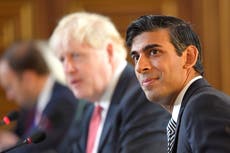Figures suggest more than a million people have coronavirus as third national lockdown begins
Rate of infection soar to one in 30 in London as top medical adviser warns of Covid measures next winter

Your support helps us to tell the story
From reproductive rights to climate change to Big Tech, The Independent is on the ground when the story is developing. Whether it's investigating the financials of Elon Musk's pro-Trump PAC or producing our latest documentary, 'The A Word', which shines a light on the American women fighting for reproductive rights, we know how important it is to parse out the facts from the messaging.
At such a critical moment in US history, we need reporters on the ground. Your donation allows us to keep sending journalists to speak to both sides of the story.
The Independent is trusted by Americans across the entire political spectrum. And unlike many other quality news outlets, we choose not to lock Americans out of our reporting and analysis with paywalls. We believe quality journalism should be available to everyone, paid for by those who can afford it.
Your support makes all the difference.More than a million people now have coronavirus the latest figures suggest as England’s chief medical officer warned that measures to stop Covid-19 may have to continue into next winter.
Boris Johnson said the highly contagious variant of the virus had pushed the rate of infection to one in 50 across the country – and one in 30 in London – leaving him with no choice but to announce this week's national lockdown.
In a worrying sign of the race against time the UK now faces, the number with the virus almost rivals the 1.3 million who have so far been vaccinated against the disease.
As Britain struggles to bring the new variant under control Mr Johnson confirmed travellers to the UK would face new tests to prevent the virus entering the country from overseas.
He reiterated his pledge to vaccinate around 13 million people by the middle of February to allow for the swiftest possible easing of lockdown. And he announced that nearly one in four of the over-80s had already been vaccinated.
But he warned there would be “long weeks ahead and we must persevere with these restrictions”.
Appearing alongside the prime minister at a press conference in Downing Street, England’s chief medical officer Professor Chris Whitty warned that some restrictions may have to be reintroduced next winter, if cases of the disease spike again.
The pandemic would not disappear “in a single bound” he cautioned.
Hours earlier cabinet office minister Michael Gove warned lockdown restrictions may have to remain in place until March, as it would take a few weeks for those vaccinated in February to develop immunity.
As the reality of another lockdown hit home the chancellor Rishi Sunak announced a new grant worth up to £9,000 for retail, hospitality and leisure businesses affected.
Mr Johnson also hinted that the government would look again at the fees paid by university students for accommodation they currently cannot use.
And, in a bid to ease growing public anxiety, Mr Johnson announced ministers would provide daily updates on the number of people vaccinated against Covid-19 from Monday.
But he came under pressure from Labour leader Sir Keir Starmer who called on the government to ensure the UK becomes the first country in the world to complete its vaccination programme.
The estimate of 1.1 million infected people in private households in England came from the Office for National Statistics (ONS).
The figures are the equivalent of around 2 per cent of the population, or one in 50 people, between 27 December and 2 January.
Between 17 and 23 December, 800,900 people, or one in 70, were estimated to have Covid-19. But the figures do not include those staying in hospitals, care homes or other institutional settings, meaning the true number of people in England with coronavirus will be higher.
Official figures also showed the recorded number of lab-confirmed coronavirus cases reached a new daily high of 60,916, while a further 830 people died within 28 days of testing positive for Covid-19.
Prof Whitty warned the public the risk was "extraordinarily high" if they did not take the government’s stay at home message seriously.
He predicted the risk level would gradually decrease over time with measures "lifted by degrees, possibly at different rates in different parts of the country, we'll have to see".


Join our commenting forum
Join thought-provoking conversations, follow other Independent readers and see their replies
Comments